一般将来时练习题(含答案)
【英语】英语一般将来时练习题含答案含解析
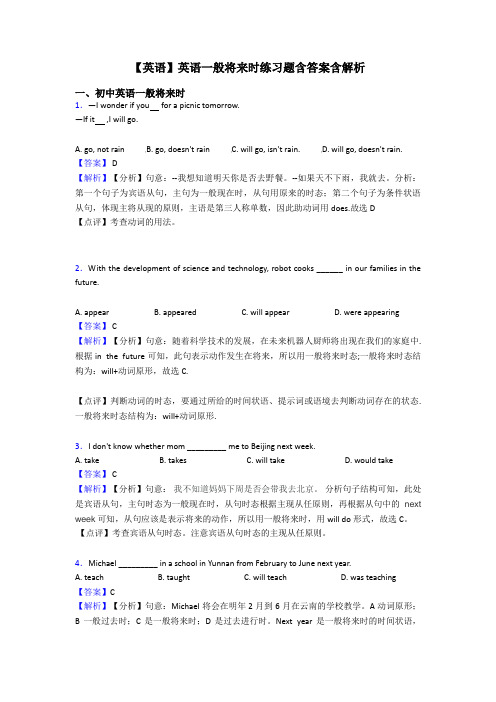
【英语】英语一般将来时练习题含答案含解析一、初中英语一般将来时1.—I wonder if you for a picnic tomorrow.—If it ,I will go.A. go, not rainB. go, doesn't rainC. will go, isn't rain.D. will go, doesn't rain.【答案】 D【解析】【分析】句意:--我想知道明天你是否去野餐。
--如果天不下雨,我就去。
分析:第一个句子为宾语从句,主句为一般现在时,从句用原来的时态;第二个句子为条件状语从句,体现主将从现的原则,主语是第三人称单数,因此助动词用does.故选D【点评】考查动词的用法。
2.With the development of science and technology, robot cooks ______ in our families in the future.A. appearB. appearedC. will appearD. were appearing【答案】 C【解析】【分析】句意:随着科学技术的发展,在未来机器人厨师将出现在我们的家庭中. 根据in the future可知,此句表示动作发生在将来,所以用一般将来时态;一般将来时态结构为:will+动词原形,故选C.【点评】判断动词的时态,要通过所给的时间状语、提示词或语境去判断动词存在的状态. 一般将来时态结构为:will+动词原形.3.I don't know whether mom _________ me to Beijing next week.A. takeB. takesC. will takeD. would take【答案】 C【解析】【分析】句意:我不知道妈妈下周是否会带我去北京。
分析句子结构可知,此处是宾语从句,主句时态为一般现在时,从句时态根据主现从任原则,再根据从句中的next week可知,从句应该是表示将来的动作,所以用一般将来时,用will do形式,故选C。
一般将来时练习题带答案

一般将来时练习题带答案一、单项选择一般将来时1.---John and Tom, you two clean the classroom today, _____?---But we cleaned it yesterday.A.do you B.will you C.didn’t you D.don’t you【答案】B【解析】交际用语.前文为祈使句,表示请求命令,此处应是征求对方意见,应是将来时态,故选B,好不好?2.Half the world’s population ______ water shortages within 15 years according to the World Bank, just one of many recent alarming reports on the world’s fresh water supply.A.are suffering B.have been suffered C.will suffer D.were suffered【答案】C【解析】试题分析:根据时间状语within 15 years,故用一般将来时。
考点:时态考查题点评:通过时间状语,上下句意思和具体语境来确定时态。
3.If my brother doesn’t go to the evening party, .A.neither do I B.I will either C.either will I D.nor will I【答案】D【解析】试题分析:考查倒装句:句意:如果我弟弟不去晚会,我也不去。
Neither/Nor+倒装句,表示“…也不是”,因为if条件句用一般现在时,代替一般将来时,所以主句是一般将来时,选D。
考点:考查倒装句4.Only by practising a few hours every day ________ be able to play the piano well.A.you would B.would you C.you will D.will you【答案】D【解析】试题分析:考查倒装句和时态:句意:只有你每天练习几个小时,你才能把钢琴弹好。
一般将来时练习题带答案
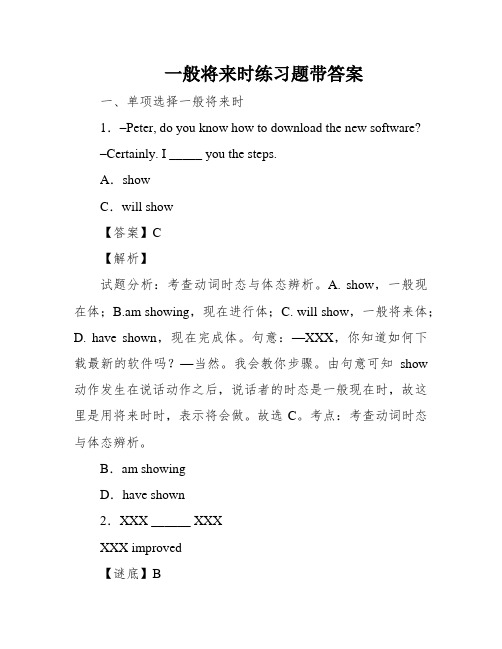
一般将来时练习题带答案一、单项选择一般将来时1.–Peter, do you know how to download the new software?–Certainly. I _____ you the steps.A.showC.will show【答案】C【解析】试题分析:考查动词时态与体态辨析。
A. show,一般现在体;B.am showing,现在进行体;C. will show,一般将来体;D. have shown,现在完成体。
句意:—XXX,你知道如何下载最新的软件吗?—当然。
我会教你步骤。
由句意可知show 动作发生在说话动作之后,说话者的时态是一般现在时,故这里是用将来时时,表示将会做。
故选C。
考点:考查动词时态与体态辨析。
B.am showingD.have shown2.XXX ______ XXXXXX improved【谜底】B【剖析】试题分析:考查时态。
根据“我们相信”说明时间将来发生,所以用将来被动。
【名师点睛】这题考查的是分歧时态的被动语态。
枢纽是确定时态。
要捉住句子的上下文含义和句中的工夫状语。
这句话没有明白的工夫状语。
这时要根据上下文的语境选择合适的时态,对句意的了解就很枢纽了。
3.--I have you asked John to come to the party this evening?--Yes,I have,but he____A.doesn't【谜底】D【解析】试题阐发:此处doesn't表示普通现在时;hasn't现在完成时;XXX过去完成时;XXX普通将来时,意为:不肯,表意愿。
句意:—我让你请求XXX来参加今晚是聚会?—是的,我请了,但他不肯意来。
根据句意选D。
考点:考查动词时态。
B.XXX't4.As your XXX, so ___ your written English.A.will【答案】A【剖析】试题分析:考查倒装句和时态:第一空是倒装句的肯定形式:So +助动词/情态动词/be动B.doC.isD.has词+主语,表示“主语和前面句子的主语一样,做同样的事”,申明为“主语也……。
【英语】 一般将来时练习题(含答案)
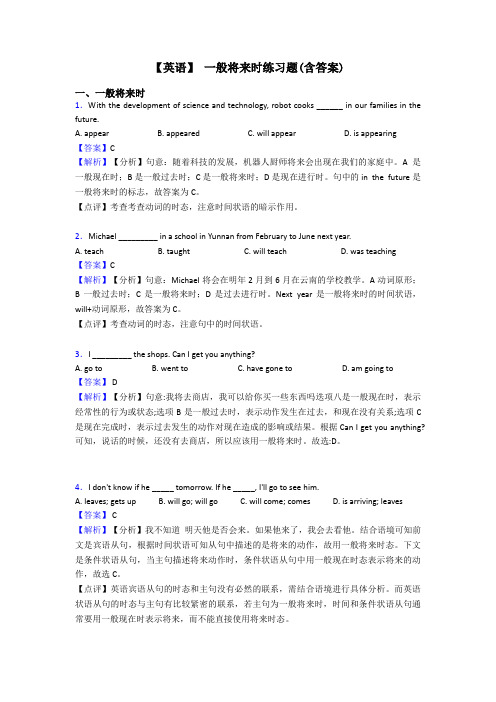
【英语】一般将来时练习题(含答案)一、一般将来时1.With the development of science and technology, robot cooks ______ in our families in the future.A. appearB. appearedC. will appearD. is appearing【答案】C【解析】【分析】句意:随着科技的发展,机器人厨师将来会出现在我们的家庭中。
A是一般现在时;B是一般过去时;C是一般将来时;D是现在进行时。
句中的in the future是一般将来时的标志,故答案为C。
【点评】考查考查动词的时态,注意时间状语的暗示作用。
2.Michael _________ in a school in Yunnan from February to June next year.A. teachB. taughtC. will teachD. was teaching【答案】C【解析】【分析】句意:Michael将会在明年2月到6月在云南的学校教学。
A动词原形;B一般过去时;C是一般将来时;D是过去进行时。
Next year是一般将来时的时间状语,will+动词原形,故答案为C。
【点评】考查动词的时态,注意句中的时间状语。
3.I _________ the shops. Can I get you anything?A. go toB. went toC. have gone toD. am going to【答案】 D【解析】【分析】句意:我将去商店,我可以给你买一些东西吗迭项八是一般现在时,表示经常性的行为或状态;选项B是一般过去时,表示动作发生在过去,和现在没有关系;选项C 是现在完成时,表示过去发生的动作对现在造成的影响或结果。
根据Can I get you anything?可知,说话的时候,还没有去商店,所以应该用一般将来时。
(完整word版)一般将来时练习题(含答案)
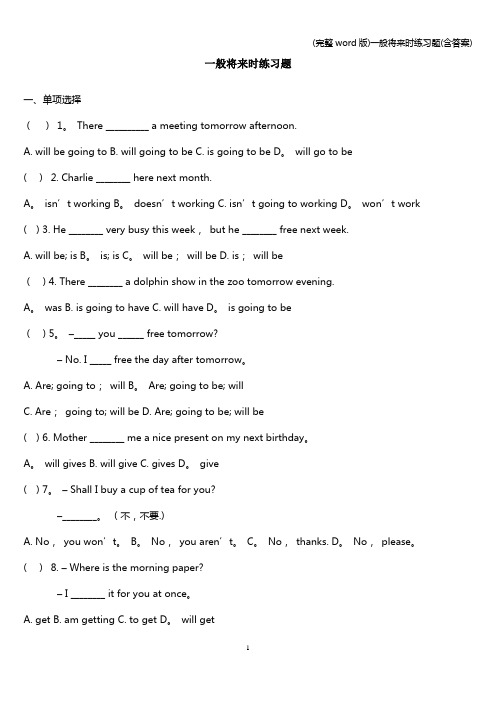
一般将来时练习题一、单项选择()1。
There __________ a meeting tomorrow afternoon.A. will be going toB. will going to beC. is going to be D。
will go to be( )2. Charlie ________ here next month.A。
isn’t working B。
doesn’t working C. isn’t going to working D。
won’t work ( ) 3. He ________ very busy this week,but he ________ free next week.A. will be; is B。
is; is C。
will be;will be D. is;will be() 4. There ________ a dolphin show in the zoo tomorrow evening.A。
was B. is going to have C. will have D。
is going to be() 5。
–_____ you ______ free tomorrow?– No. I _____ free the day after tomorrow。
A. Are; going to;will B。
Are; going to be; willC. Are;going to; will beD. Are; going to be; will be( ) 6. Mother ________ me a nice present on my next birthday。
A。
will gives B. will give C. gives D。
give( ) 7。
– Shall I buy a cup of tea for you?–________。
一般将来时练习题(含答案)经典
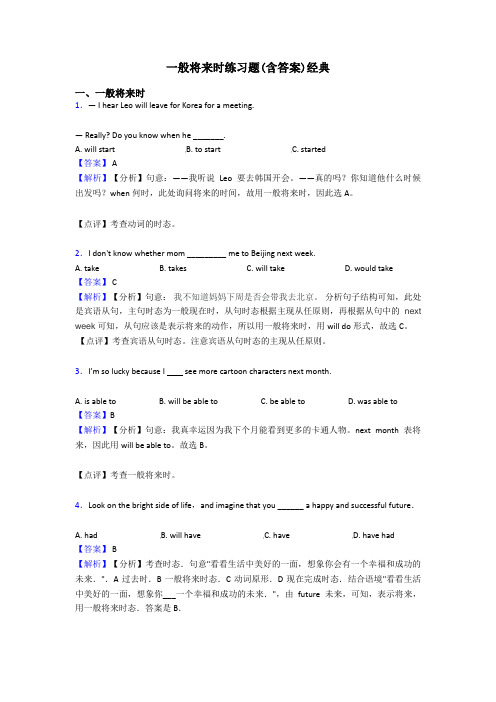
一般将来时练习题(含答案)经典一、一般将来时1.— I hear Leo will leave for Korea for a meeting.— Really? Do you know when he _______.A. will startB. to startC. started【答案】 A【解析】【分析】句意:——我听说Leo要去韩国开会。
——真的吗?你知道他什么时候出发吗?when何时,此处询问将来的时间,故用一般将来时,因此选A。
【点评】考查动词的时态。
2.I don't know whether mom _________ me to Beijing next week.A. takeB. takesC. will takeD. would take【答案】 C【解析】【分析】句意:我不知道妈妈下周是否会带我去北京。
分析句子结构可知,此处是宾语从句,主句时态为一般现在时,从句时态根据主现从任原则,再根据从句中的next week可知,从句应该是表示将来的动作,所以用一般将来时,用will do形式,故选C。
【点评】考查宾语从句时态。
注意宾语从句时态的主现从任原则。
3.I’m so lucky because I see more cartoon characters next month.A. is able toB. will be able toC. be able toD. was able to【答案】B【解析】【分析】句意:我真幸运因为我下个月能看到更多的卡通人物。
next month表将来,因此用will be able to。
故选B。
【点评】考查一般将来时。
4.Look on the bright side of life,and imagine that you ______ a happy and successful future.A. hadB. will haveC. haveD. have had【答案】 B【解析】【分析】考查时态.句意"看看生活中美好的一面,想象你会有一个幸福和成功的未来.".A过去时.B一般将来时态.C动词原形.D现在完成时态.结合语境"看看生活中美好的一面,想象你___一个幸福和成功的未来.",由future未来,可知,表示将来,用一般将来时态.答案是B.5.We ________ a party for Kate. It's supposed to be a surprise.A. were havingB. hadC. will haveD. have had【答案】C【解析】【分析】句意:我们将为凯特举办一个聚会。
(完整word)一般将来时练习题100道(附答案)

一般将来时练习题100道一、选择题1. “The meeting is scheduled to begin at 7 o’clock。
" “But _______ a delay。
”A. It will be B。
there’d beC. there will beD. there is2. He’ll leave for Paris before you ______ next week。
A。
will come back B。
will be backC. come back D。
came back3. Our next meeting _______ on 1st December.A。
has been held B。
will holdC. is to be held D。
is holding4. Where ________ is a will, there is a way。
A. there will haveB. has been thereC. there is D。
there has been5. It ________ be Wednesday tomorrow。
A. is going to B。
willC. is about toD. is to6. There __________ a meeting tomorrow afternoon。
A。
will be going to B. will going to beC. is going to beD. will go to be7。
Charlie ________ here next month。
A。
isn’t working B. doesn't workingC. isn’t going to working D。
won’t work8。
He ________ very busy this week, he ________ free next week.A。
一般将来时练习题含答案

B.mustn’t use; will you see
C.not use; you will see
D.not use; will you see
【答案】D
【解析】
试题分析:考察情态动词。前一个空中,should表示劝告,义务,建议,命令,其同义词是ought to,在疑问句中,通常用should代替ought to。后一个空前面有否定词seldom所以将will提前构成部分倒装。该句意思为:学生在他们学校被要求不要使用手机,所以你很少看见他们用手机。根据句意,故选D
【答案】D
【解析】
试题分析:考查动词的时态。句意:Crawford夫人问道:“你(长大了)想干什么?”“哦,我想当总统。”男孩面带微笑地说。根据问句“What do you want to be?”可知,该句中暗含“when you grow up”,因此回答用一般将来时。
2.It is required that the students _____ mobile phones in their school, so seldom _____ them using one.
考点:考查句子结构和时态
9.–Are you available at 3 tomorrow afternoon?
--Sorry, I ________ a meeting at that time.
A.am havingB.will be havingC.will haveD.have
【答案】B
【解析】
考点:考查倒装句
15.Half the world’s population ______ water shortages within 15 years according to the World Bank, just one of many recent alarming reports on the world’s fresh water supply.
一般将来时练习题及答案
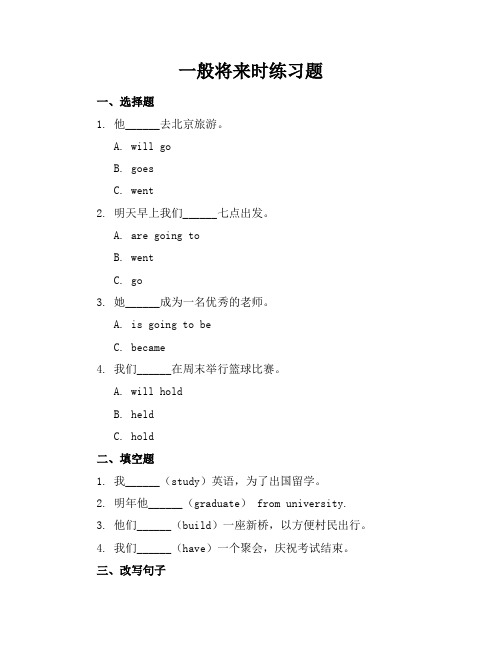
一般将来时练习题一、选择题1. 他______去北京旅游。
A. will goB. goesC. went2. 明天早上我们______七点出发。
A. are going toB. wentC. go3. 她______成为一名优秀的老师。
A. is going to beC. became4. 我们______在周末举行篮球比赛。
A. will holdB. heldC. hold二、填空题1. 我______(study)英语,为了出国留学。
2. 明年他______(graduate) from university.3. 他们______(build)一座新桥,以方便村民出行。
4. 我们______(have)一个聚会,庆祝考试结束。
三、改写句子1. They will visit the Great Wall next week.改写为:They are going to ______ ______ ______ next week.2. She will be a doctor in the future.改写为:She ______ ______ ______ a doctor in the future.3. We will celebrate the New Year with our family.改写为:We ______ ______ ______ the New Year with our family.四、翻译句子1. 明天我们会去动物园看熊猫。
_____________________________2. 他计划在下个月开始减肥。
_____________________________3. 他们打算在春天种植更多的树木。
_____________________________4. 我将来要成为一名科学家。
_____________________________五、情景对话A: 你长大后想做什么?B: 我______(be)一名画家。
(英语)英语一般将来时练习题20篇含解析
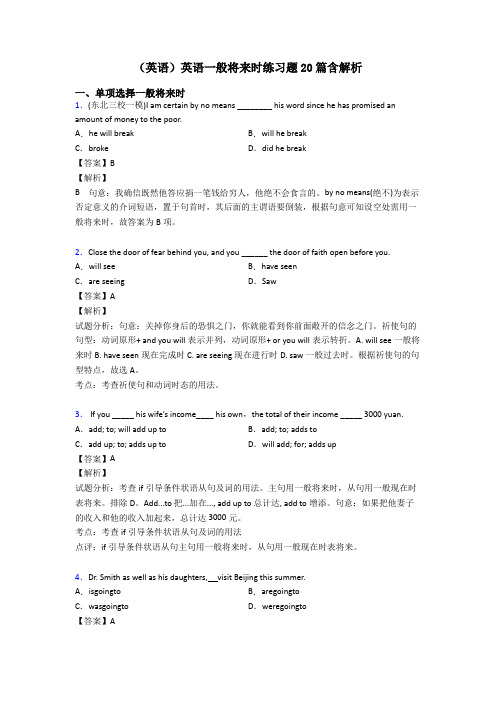
(英语)英语一般将来时练习题20篇含解析一、单项选择一般将来时1.(东北三校一模)I am certain by no means ________ his word since he has promised an amount of money to the poor.A.he will break B.will he breakC.broke D.did he break【答案】B【解析】B句意:我确信既然他答应捐一笔钱给穷人,他绝不会食言的。
by no means(绝不)为表示否定意义的介词短语,置于句首时,其后面的主谓语要倒装,根据句意可知设空处需用一般将来时,故答案为B项。
2.Close the door of fear behind you, and you ______ the door of faith open before you. A.will see B.have seenC.are seeing D.Saw【答案】A【解析】试题分析:句意:关掉你身后的恐惧之门,你就能看到你前面敞开的信念之门。
祈使句的句型:动词原形+ and you will表示并列,动词原形+ or you will表示转折。
A. will see 一般将来时 B. have seen现在完成时 C. are seeing 现在进行时D. saw一般过去时。
根据祈使句的句型特点,故选A。
考点:考查祈使句和动词时态的用法。
3.If you _____ his wife’s income____ his own,the total of their income _____ 3000 yuan. A.add; to; will add up to B.add; to; adds toC.add up; to; adds up to D.will add; for; adds up【答案】A【解析】试题分析:考查if引导条件状语从句及词的用法。
一般将来时练习题含答案及解析
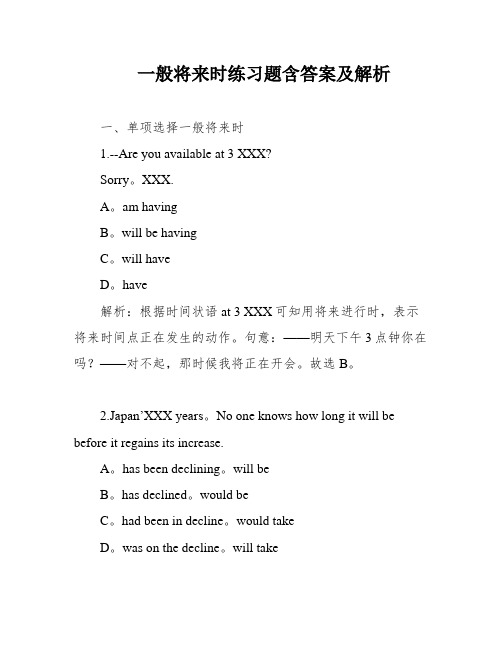
一般将来时练习题含答案及解析一、单项选择一般将来时1.--Are you available at 3 XXX?Sorry。
XXX.A。
am havingB。
will be havingC。
will haveD。
have解析:根据时间状语at 3 XXX可知用将来进行时,表示将来时间点正在发生的动作。
句意:——明天下午3点钟你在吗?——对不起,那时候我将正在开会。
故选B。
2.Japan’XXX years。
No one knows how long it will be before it regains its increase.A。
has been declining。
will beB。
has declined。
would beC。
had been in decline。
would takeD。
was on the decline。
will take解析:根据句意和时间指示词XXX和介词before可以判断前后应该分别采用现在完成进行时和一般将来时。
句意:日本经济在过去20年里一直在下滑。
谁也不知道在它恢复增长前还需要多长的时间。
根据句意可以判断,故选A。
3.If y ou add his wife’s e to his own。
the total of their e will add up to 3000 yuan.A。
add。
to。
will add up toB。
add up。
to。
adds up toC。
adds。
to。
will add up toD。
adds up。
to。
adds up to解析:主句用一般将来时,从句用一般现在时表将来。
Add。
to把。
加在。
add up to总计达。
add to增添。
句意:如果把他妻子的收入和他的收入加起来,总计达3000元。
故选A。
4.我下个星期六将要前往北京。
你知道星期六最早的航班什么时候起飞吗?(改写句子,删除明显有问题的选项)5.“你的窗户还是开着的吗?太冷了!” “哦,对不起,它们关不上。
【英语】 一般将来时练习题(含答案)经典1
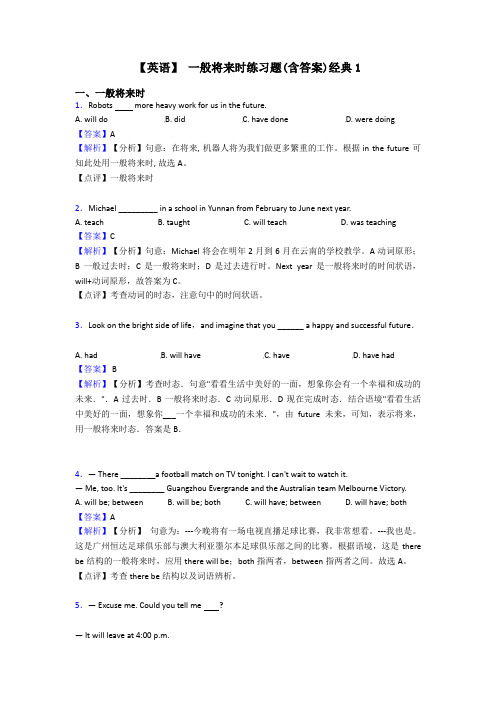
【英语】一般将来时练习题(含答案)经典1一、一般将来时1.Robots more heavy work for us in the future.A. will doB. didC. have doneD. were doing【答案】A【解析】【分析】句意:在将来, 机器人将为我们做更多繁重的工作。
根据in the future 可知此处用一般将来时, 故选A。
【点评】一般将来时2.Michael _________ in a school in Yunnan from February to June next year.A. teachB. taughtC. will teachD. was teaching【答案】C【解析】【分析】句意:Michael将会在明年2月到6月在云南的学校教学。
A动词原形;B一般过去时;C是一般将来时;D是过去进行时。
Next year是一般将来时的时间状语,will+动词原形,故答案为C。
【点评】考查动词的时态,注意句中的时间状语。
3.Look on the bright side of life,and imagine that you ______ a happy and successful future.A. hadB. will haveC. haveD. have had【答案】 B【解析】【分析】考查时态.句意"看看生活中美好的一面,想象你会有一个幸福和成功的未来.".A过去时.B一般将来时态.C动词原形.D现在完成时态.结合语境"看看生活中美好的一面,想象你___一个幸福和成功的未来.",由future未来,可知,表示将来,用一般将来时态.答案是B.4.— There ________a football match on TV tonight. I can't wait to watch it.— Me, too. It's ________ Guangzhou Evergrande and the Australian team Melbourne Victory.A. will be; betweenB. will be; bothC. will have; betweenD. will have; both【答案】A【解析】【分析】句意为:---今晚将有一场电视直播足球比赛,我非常想看。
一般将来时题目20道含答案
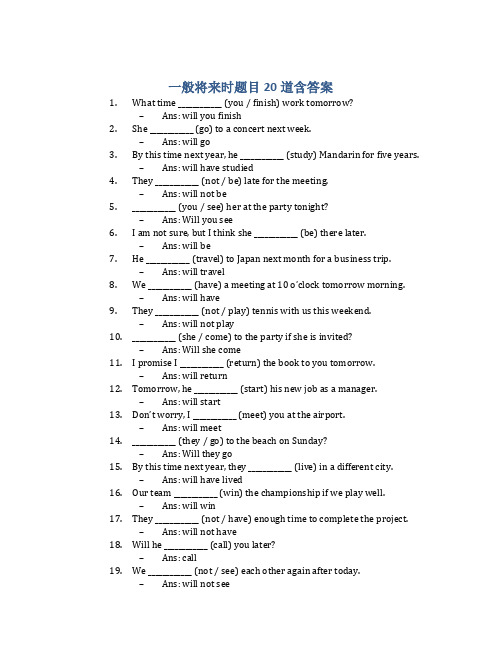
一般将来时题目20道含答案1.What time ____________ (you / finish) work tomorrow?–Ans: will you finish2.She ____________ (go) to a concert next week.–Ans: will go3.By this time next year, he ____________ (study) Mandarin for five years.–Ans: will have studied4.They ____________ (not / be) late for the meeting.–Ans: will not be5.____________ (you / see) her at the party tonight?–Ans: Will you see6.I am not sure, but I think she ____________ (be) there later.–Ans: will be7.He ____________ (travel) to Japan next month for a business trip.–Ans: will travel8.We ____________ (have) a meeting at 10 o’clock tomorrow morning.–Ans: will have9.They ____________ (not / play) tennis with us this weekend.–Ans: will not play10.____________ (she / come) to the party if she is invited?–Ans: Will she come11.I promise I ____________ (return) the book to you tomorrow.–Ans: will return12.Tomorrow, he ____________ (start) his new job as a manager.–Ans: will start13.Don’t worry, I ____________ (meet) you at the airport.–Ans: will meet14.____________ (they / go) to the beach on Sunday?–Ans: Will they go15.By this time next year, they ____________ (live) in a different city.–Ans: will have lived16.Our team ____________ (win) the championship if we play well.–Ans: will win17.They ____________ (not / have) enough time to complete the project.–Ans: will not have18.Will he ____________ (call) you later?–Ans: call19.We ____________ (not / see) each other again after today.–Ans: will not see20.By the time they arrive, we ____________ (prepare) everything for theparty.–Ans: will have prepared以上是一般将来时的20个练习题及答案。
一般将来时练习题带答案
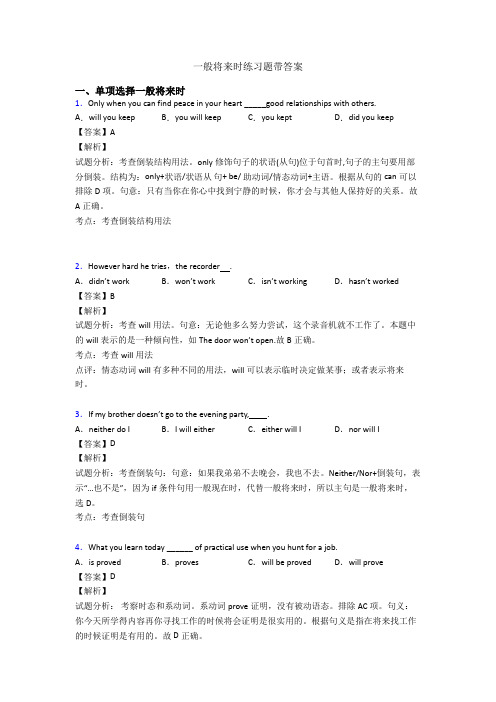
【答案】A
【解析】
试题分析:句意:我确信你的建议会导致这个问题的解决。contribute to“贡献,有助于”,to是介词,后面做动名词,所以选A。
考点:考查动名词做宾语
8.The projectto developing the economy and reducing poverty when it is completed.
A.will goB.am going
C.have goneD.went
【答案】A
【解析】
从第二人回答的“Really?”可以看出他在此之前并不知道Mike住进医院的事情。所以,今天下午去医院探视就不会是早就有的计划,所以排除B项。
13.---Do you have any special plan for this weekend?
考点:考查时态
14.If you _____ his wife’s income____ his own,the total of their income _____ 3000 yuan.
A.add; to; will add up toB.add; to; adds to
C.add up; to; adds up toD.will add; for; adds up
9.The sky is clouding over;we can see there ________ a rainstorm.
A.is going to beB.is going to have
C.will beD.will have
ห้องสมุดไป่ตู้【答案】A
一般将来时练习题含答案及解析
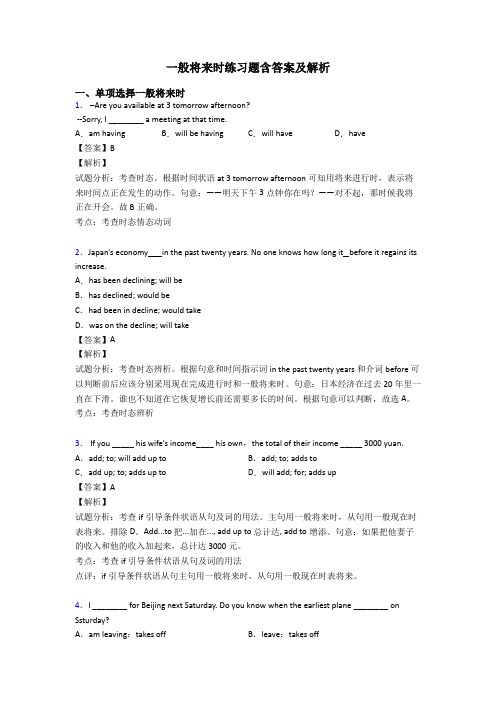
一般将来时练习题含答案及解析一、单项选择一般将来时1.–Are you available at 3 tomorrow afternoon?--Sorry, I ________ a meeting at that time.A.am having B.will be having C.will have D.have【答案】B【解析】试题分析:考查时态。
根据时间状语at 3 tomorrow afternoon可知用将来进行时,表示将来时间点正在发生的动作。
句意:——明天下午3点钟你在吗?——对不起,那时候我将正在开会。
故B正确。
考点:考查时态情态动词2.Japan’s economy in the past twenty years. No one knows how long it before it regains its increase.A.has been declining; will beB.has declined; would beC.had been in decline; would takeD.was on the decline; will take【答案】A【解析】试题分析:考查时态辨析。
根据句意和时间指示词in the past twenty years和介词before 可以判断前后应该分别采用现在完成进行时和一般将来时。
句意:日本经济在过去20年里一直在下滑。
谁也不知道在它恢复增长前还需要多长的时间。
根据句意可以判断,故选A。
考点:考查时态辨析3.If you _____ his wife’s income____ his own,the total of their income _____ 3000 yuan. A.add; to; will add up to B.add; to; adds toC.add up; to; adds up to D.will add; for; adds up【答案】A【解析】试题分析:考查if引导条件状语从句及词的用法。
- 1、下载文档前请自行甄别文档内容的完整性,平台不提供额外的编辑、内容补充、找答案等附加服务。
- 2、"仅部分预览"的文档,不可在线预览部分如存在完整性等问题,可反馈申请退款(可完整预览的文档不适用该条件!)。
- 3、如文档侵犯您的权益,请联系客服反馈,我们会尽快为您处理(人工客服工作时间:9:00-18:30)。
一般将来时练习题(含答案)一、一般将来时1.Robots more heavy work for us in the future.A. will doB. didC. have doneD. were doing【答案】A【解析】【分析】句意:在将来, 机器人将为我们做更多繁重的工作。
根据in the future 可知此处用一般将来时, 故选A。
【点评】一般将来时2.—Have you watched the new movie Kung Fu Panda 3, Kelly?—Not yet. I _____ it with my classmate tonight.A. will watchB. was watchingC. have watched【答案】A【解析】【分析】句意:—凯莉,你看过新电影《功夫熊猫3》吗?—还没有呢。
今天晚上我要和我的同学一起去看。
A. will watch一般将来时态形式;B. was watching过去进行时态形式;C. have watched现在完成时态形式。
本句描述的是今天晚上将要发生的动作,句子用一般将来时态。
故选A。
【点评】本题考查时态辨析。
以及will watch;was watching;have watched三种时态的用法和区别3.Michael _________ in a school in Yunnan from February to June next year.A. teachB. taughtC. will teachD. was teaching【答案】C【解析】【分析】句意:Michael将会在明年2月到6月在云南的学校教学。
A动词原形;B一般过去时;C是一般将来时;D是过去进行时。
Next year是一般将来时的时间状语,will+动词原形,故答案为C。
【点评】考查动词的时态,注意句中的时间状语。
4.— Excuse me. Could you tell me ?— It will leave at 4:00 p.m.A. how will you go to ShanghaiB. how you will go to ShanghaiC. when the bus would leave for ShanghaiD. when the bus will leave for Shanghai【答案】 D【解析】【分析】这是一道根据回答写出问句所缺成分的题目,阅题时要仔细分析回答的句子。
句意:打扰一下,你能告诉我这辆公交车什么时候动身前往上海吗?它将会在下午4点的时候离开。
据回答知问句问的是时间,故排除A和B。
由题知,句子是一般将来时,故问句中也要用一般将来时态。
故选D。
【点评】本题需要考生根据回答反推问题,在阅题时要仔细审题。
5.I _________ the shops. Can I get you anything?A. go toB. went toC. have gone toD. am going to【答案】 D【解析】【分析】句意:我将去商店,我可以给你买一些东西吗迭项八是一般现在时,表示经常性的行为或状态;选项B是一般过去时,表示动作发生在过去,和现在没有关系;选项C 是现在完成时,表示过去发生的动作对现在造成的影响或结果。
根据Can I get you anything?可知,说话的时候,还没有去商店,所以应该用一般将来时。
故选:D。
6.We ________ a party for Kate. It's supposed to be a surprise.A. were havingB. hadC. will haveD. have had【答案】C【解析】【分析】句意:我们将为凯特举办一个聚会。
这应该是个惊喜。
根据句意语境可知举办聚会这个动作还没有发生,需用一般将来时,故选C。
【点评】考查动词时态辨析题。
熟练掌握时态的用法。
7.Mr. Green, a famous writer, ______our school next week.A. visitedB. visitsC. was visitingD. will visit【答案】 D【解析】【分析】句意:格林先生,一位著名的作家,下周要来我们学校参观。
A是一般过去时;B是一般现在时;C是过去进行时;D是一般将来时。
根据next week可知此处用一般将来时,故答案为D。
【点评】考查动词的时态,注意找语境中的时间状语。
8.There ______ a funny cartoon on CCTV 6 this evening.A. willB. will haveC. is going to beD. is going to have【答案】 C【解析】【分析】句意:今天晚上CCTV6有一部有趣的动画片。
今天晚上,将会有,用there will be 或者there is going to be因为a funny cartoon是单数。
故选C。
【点评】考查时态的用法。
9.—You'd better take an umbrella. The weather report says it in the afternoon.— Thank you. I will put one in my bag.A. will rainB. rainsC. is raining【答案】 A【解析】【分析】句意:——你最好带把伞。
天气预报说是下午要下雨。
——谢谢你。
我会在包里放一个。
A一般将来时,B一般现在时,C现在进行时,根据 in the afternoon和 Iwill put one in my bag 可知时态是一般将来时,故选A。
【点评】考查时态,注意一般将来时的用法。
10.— Your father has gone to Shenzhen on business, hasn't he?—Yes. And he ________ in two weeks.A. will returnB. has returnedC. returnedD. returns【答案】 A【解析】【分析】句意:——你的父亲已经去深圳出差,不是吗?——是的,他打算两周后回来。
根据时间状语 in two weeks ,可知时态是一般将来时,will+动词原形,故选A。
【点评】此题考查一般将来时。
根据时间状语确定句子时态。
11.— Summer holiday is coming. What are you going to do?— I'm not sure. Maybe I to the beach.A. goB. wentC. will goD. have gone【答案】 C【解析】【分析】句意:一一暑假要来了,你打算做什么?一一我不确定,可能我要去海滩。
A.一般现在时态,表示经常性、习惯性的动作;B.一般过去时态,表示过去发生的动作;C.一般将来时态,表示将要发生的动作;D.现在完成时态,强调过去发生的动作对现在造成的影响或结果.本题谈论的是暑假的计划,谈论将来,用一般将来时态。
故选C。
12.The Disneyland Park in Shanghai in a few years.A. will completeB. will be completedC. has completedD. is completed【答案】 B【解析】【分析】句意:几年之后,这个迪尼斯公园将在上海被建成。
根据时间状语in afew years可知本题用将来时的被动语态will be done的结构。
结合句意,故选B【点评】此题考查一般将来时的被动语态的用法。
13.I don't know if my brother _____________ here tomorrow. If he _____________, I'll call you.A. comes; comesB. will come; comesC. comes; will comeD. will come; will come【答案】 B【解析】【分析】句意:我不知道是否我哥哥明天将来,如果他来,我将给你打电话。
第一个句子中if意思是是否,tomorrow表明时态是一般将来时,所以用will come;第二个句子中if 意思是如果,引导条件状语从句,从句用一般现在时,主句用will+动词原形,句子是从句,所以用一般现在时,主语是he,所以用comes,故选B。
【点评】考查一般将来时和条件状语从句,注意平时识记if的用法,理解句意。
14.If it is clear tomorrow , I ________a bike to the underground station.A. rideB. will rideC. rodeD. have ridden【答案】 B【解析】【分析】句意:如果明天天气好的话,我会骑自行车去地铁站。
ride骑车,动词原形;will ride是一般将来时态;rode是ride的过去式形式;have ridden是现在完成时态。
句中if引导的是条件状语从句,从句中一般现在时态,主句应使用一般将来时态,故应选B。
【点评】考查动词的时态,以及if引导的是条件状语从句,从句中一般现在时态,主句应使用一般将来时态。
15.— I hear Leo will leave for Korea for a meeting.— Really? Do you know when he _______.A. will startB. to startC. started【答案】 A【解析】【分析】句意:——我听说Leo要去韩国开会。
——真的吗?你知道他什么时候出发吗?when何时,此处询问将来的时间,故用一般将来时,因此选A。
【点评】考查动词的时态。
16.If our government ________ pay attention to the safety of food, our health ________ in danger.A. isn't; isB. doesn't; will beC. won't; isD. isn't; will be【答案】 B【解析】【分析】句意:如果我们的政府没有关注食品的安全,我们的健康将处于危险中。
If 引导的条件状语从句,用一般现在时表示一般将来时,主句用一般将来时。
第一空主语our government是第三人称单数,位于实义动词前,故此处用助动词doesn't。
